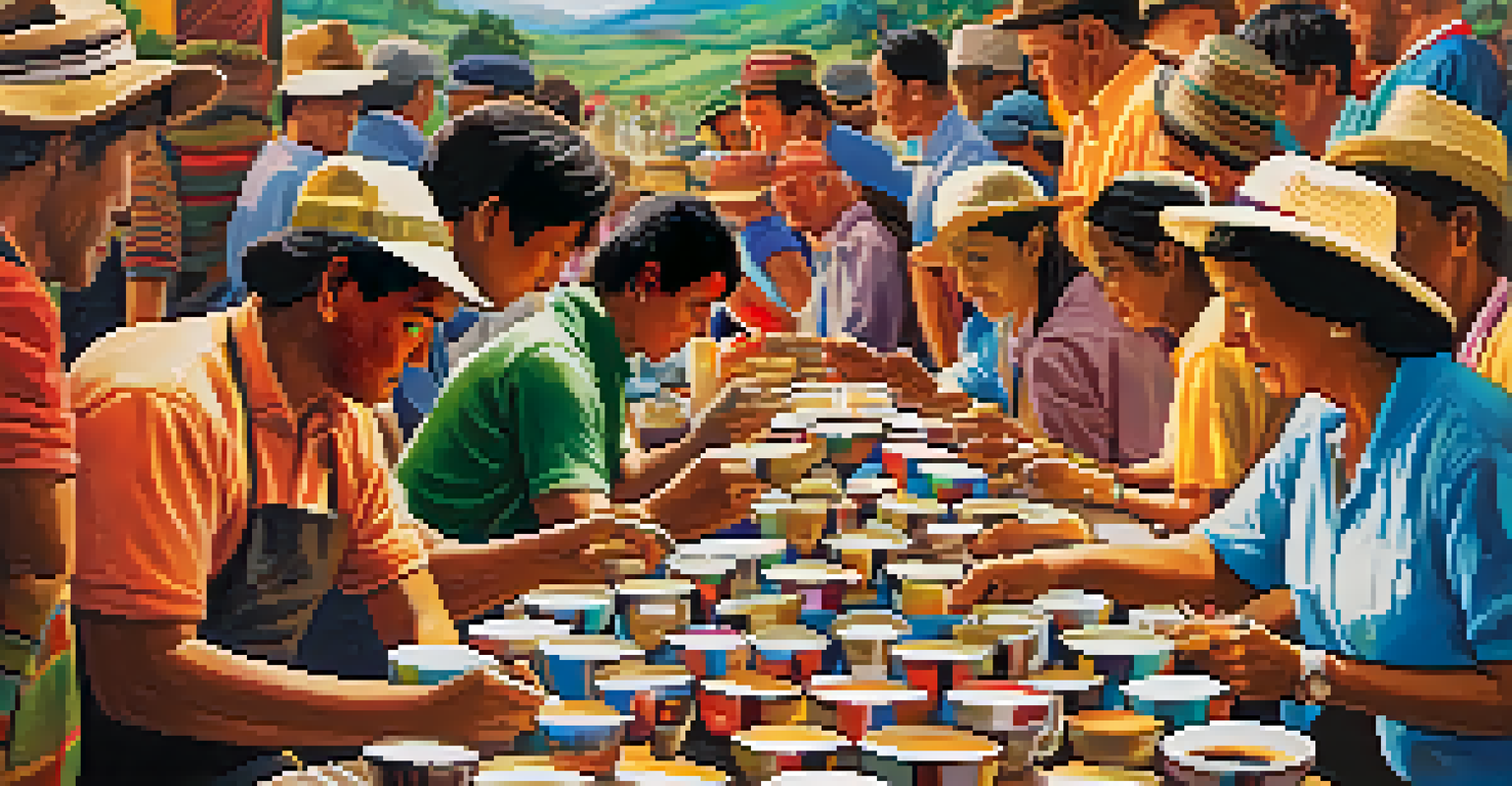Peruvian Coffee: Unveiling the Rich Culture Behind Every Cup

The Origins of Peruvian Coffee and Its Unique Flavors
Peruvian coffee is more than just a drink; it’s a story steeped in tradition. Grown in the high-altitude regions of the Andes, this coffee benefits from the unique microclimates that produce a variety of flavors. The rich volcanic soil, combined with the right amount of rainfall, creates the perfect conditions for coffee beans to thrive.
Coffee is a language in itself.
Many varieties of beans are cultivated here, including Arabica, which is known for its smooth, rich taste. This diversity in cultivation results in a wide range of flavor profiles, from fruity to chocolaty, making each cup a unique experience. The careful harvesting and processing techniques also contribute to the preservation of these distinctive flavors.
Moreover, the coffee culture in Peru is deeply intertwined with the daily lives of the local farmers. They employ traditional methods passed down through generations, blending modern techniques with age-old practices to enhance their coffee's quality and flavor. This passion and dedication are palpable in every sip.
The Role of Coffee Cooperatives in Peru's Economy
Coffee cooperatives play a crucial role in the Peruvian economy, empowering small-scale farmers. By banding together, these farmers can negotiate better prices for their coffee beans, ensuring they receive fair compensation for their hard work. This collaborative approach not only benefits individual farmers but also strengthens the community as a whole.

These cooperatives often prioritize organic and sustainable farming practices, which not only improve the quality of the coffee but also help protect the environment. By focusing on sustainable methods, they ensure that the land remains fertile for future generations. This commitment to the earth reflects the deep respect these farmers have for their heritage.
Peruvian Coffee's Unique Heritage
Peruvian coffee is celebrated for its diverse flavors, influenced by the high-altitude regions, rich volcanic soil, and traditional farming methods.
In turn, these cooperative efforts have led to international recognition for Peruvian coffee, making it a sought-after product in specialty markets. Consumers are increasingly drawn to ethically sourced products, and Peruvian coffee fits the bill beautifully, marrying quality with a positive social impact.
Cultural Significance: Coffee in Peruvian Society
In Peru, coffee is more than just a beverage; it's a cultural cornerstone. Every morning, families gather to enjoy a cup of coffee together, fostering connections and conversations. This ritual not only strengthens family bonds but also serves as a way to share stories and traditions, making coffee a vital part of their social fabric.
Sustainability is no longer about doing less harm. It's about doing more good.
Furthermore, coffee is often served during special occasions and celebrations, acting as a symbol of hospitality. When guests arrive, offering a cup of coffee is a warm gesture that embodies the Peruvian spirit of welcome. This sense of community around coffee highlights its importance in social interactions and cultural exchanges.
The influence of coffee even extends to festivals and local events, where it takes center stage in various forms. From coffee tastings to barista competitions, the celebration of coffee showcases its significance in the identity of Peru, illustrating how this simple drink can unite people across generations.
Sustainable Practices: Protecting Peru's Coffee Future
Sustainability is a pressing concern in coffee production, and Peru is at the forefront of these efforts. Farmers are increasingly adopting practices that conserve water, preserve biodiversity, and maintain soil health. These initiatives not only ensure the longevity of their crops but also protect the rich ecosystems of the Andes.
Moreover, organic farming methods are gaining popularity among Peruvian coffee producers. By avoiding synthetic fertilizers and pesticides, farmers contribute to a healthier environment while also enhancing the flavor profile of their coffee. This organic approach appeals to environmentally conscious consumers looking for responsibly sourced products.
Economic Benefits of Coffee Cooperatives
Coffee cooperatives in Peru empower small-scale farmers by ensuring fair prices and promoting sustainable practices that benefit both the economy and the environment.
Through education and training programs, many cooperatives are also empowering farmers to implement these sustainable practices. By sharing knowledge and resources, they create a community that values both quality coffee and environmental stewardship. This commitment to sustainability is essential for securing a prosperous future for Peruvian coffee.
Peruvian Coffee Varieties: A Taste Adventure
One of the most exciting aspects of Peruvian coffee is its variety. With over 40 different coffee-growing regions, each area produces beans with unique characteristics. For instance, the coffee from the northern region of Cajamarca often has bright acidity and floral notes, while beans from the southern region of Arequipa tend to be more mellow and chocolaty.
Exploring these different varieties is like embarking on a culinary adventure. Coffee lovers can experience tasting notes ranging from fruity and citrusy to deep and earthy, depending on the region and processing methods. This diversity reflects the rich geographic and cultural tapestry of Peru, making each cup a journey in itself.
Additionally, the way coffee is prepared and served can also vary significantly across regions. Traditional methods often include brewing coffee with spices or serving it with milk, showcasing local flavors and preferences. This not only enhances the coffee experience but also offers a glimpse into the heart of Peruvian culture.
The Global Impact of Peruvian Coffee Trade
Peruvian coffee has made a significant mark on the global coffee market, with its quality being recognized worldwide. As consumers become more informed about their coffee choices, they are increasingly seeking out specialty coffees that tell a story. Peruvian coffee, with its rich heritage and commitment to sustainability, fits this growing demand perfectly.
The international market has also opened new doors for Peruvian farmers, allowing them to export their products to coffee enthusiasts around the globe. This not only boosts the local economy but also helps preserve traditional farming practices that might otherwise be lost. As a result, farmers can continue to share their cultural heritage through the coffee they produce.
Cultural Importance of Coffee
In Peru, coffee serves as a cultural cornerstone, fostering connections among families and communities while playing a significant role in social rituals and celebrations.
However, this global demand also comes with challenges, such as fluctuating prices and competition from larger coffee-producing countries. To navigate these challenges, Peruvian farmers must remain adaptable and innovative. By focusing on quality and sustainability, they can carve out a niche in the global market while staying true to their roots.
Coffee Tourism: Experiencing Peru Through Its Brews
Coffee tourism is an emerging trend that allows visitors to experience the rich coffee culture of Peru firsthand. Travelers can tour coffee farms, learn about the production process, and even participate in the harvest. This immersive experience not only deepens their appreciation for coffee but also supports local economies.
Many farms offer tasting sessions where visitors can sample various Peruvian coffee varieties, highlighting the unique flavors and aromas. This hands-on approach to learning about coffee creates lasting memories and connections, as visitors engage with the farmers and their stories. It's a wonderful way to see how much effort goes into every cup.

Additionally, coffee tourism promotes sustainable practices, as many farms prioritize eco-friendly methods. By supporting these initiatives, visitors contribute to the preservation of the environment while enjoying a unique cultural experience. This blend of travel, education, and sustainability makes coffee tourism a rewarding adventure for everyone involved.